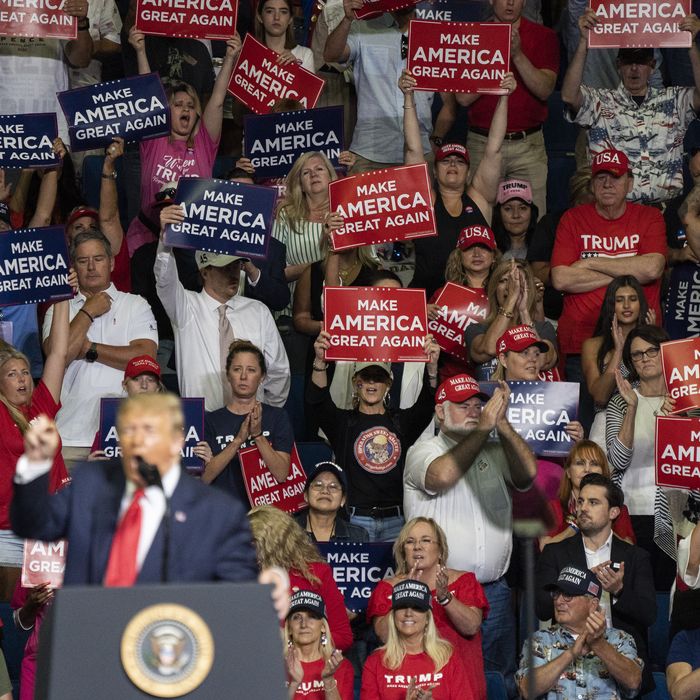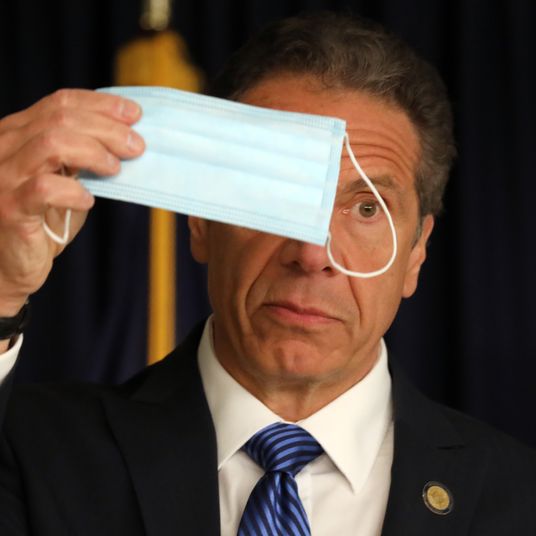
We’re committed to keeping our readers informed.
We’ve removed our paywall from essential coronavirus news stories. Become a subscriber to support our journalists. Subscribe now.
A week ago, President Trump and his campaign held a controversial mid-pandemic indoor rally at the BOK Center in Tulsa, Oklahoma, in the hopes of rebooting his struggling reelection bid — against the advice of the top two infectious-disease experts on the White House coronavirus task force and countless other public-health experts, including the head of the Tulsa Public Health Department. Instead, the Trump team repeatedly dismissed the risks of holding the rally (despite a surge of coronavirus infections in Oklahoma, Tulsa, and numerous states around the country); made attendees waive their right to sue the campaign should they catch the coronavirus there; and refused to mandate face masks or social distancing at the venue — even after the campaign announced, just before the rally, that several members of its advance team had tested positive for COVID-19. And according to Billboard and the Washington Post, the Trump campaign didn’t just fail to require or encourage social distancing at the Tulsa rally — it took action to prevent it.
On Friday, Billboard reported that Trump campaign staff methodically removed “Do Not Sit Here Please!” stickers, which arena staff had stuck to thousands of seats in the venue as part of a safety (and liability) protocol meant to facilitate social distancing by encouraging rally attendees to remain at least one seat apart from each other.
While arena staff, as seen in this local news photograph, were affixing the three-inch square stickers to every other seat in the venue before the start of the event, Trump campaign staff contacted an executive at ASM Global, the company which manages the arena, and asked them to stop. The work continued. Then, according to ASM Global VP Doug Thornton, Trump campaign staff went through the stadium and removed the stickers themselves.
And there’s video of it:
The Washington Post captions:
[T]wo men — one in a suit and one wearing a badge and a face mask — can be seen pulling stickers off seats in a section of the arena. It is unclear who those two men are. When Trump took the stage on Saturday evening, the crowd was clustered together and attendees were not leaving empty seats between themselves.
“[The Trump campaign] also told us that they didn’t want any signs posted saying we should social distance in the venue,” Thornton explained to Billboard. The stickers, he said, were a mandatory component of a new safety protocol called VenueShield that ASM developed with public-health experts to limit the potential transmission of the coronavirus at the hundreds of venues the company manages around the world. (The company also installed plexiglass barriers and social-distance-indicating floor stickers to protect arena vendors.)
The Trump campaign has since denied asking to remove the seat stickers, telling the Post in a statement that “there were signs posted and we are not aware of any campaign staff asking that they be removed,” while Trump campaign spokesman Tim Murtaugh insisted that the Tulsa rally “was in full compliance with local requirements. and that “every rally attendee received a temperature check prior to admission, was given a face mask, and provided ample access to hand sanitizer.” (It handed out “Make America Great Again 2020”–branded sanitizer bottles.)
Thornton also insisted ASM Global was convinced it had no legal standing to turn down or cancel the event, since the BOK Center is a publicly owned stadium and the rally was allowed under the state’s reopening plan and approved and given the legal go-ahead, at full capacity, by Oklahoma’s Republican governor, the state’s Supreme Court, and Tulsa’s Republican mayor, G.T. Bynum. Indeed, those easy green lights are one of the main reasons the Trump campaign chose Tulsa for the rally in the first place.
(Mayor Bynum later claimed that he would have supported ASM if it had chosen to cancel the rally, but that appears to have been retroactive posturing according to one of Bynum’s aides, Jack Graham, who resigned in protest afterward — telling Billboard that “the mayor’s lack of leadership could have killed someone, that’s a red line for me.” On Thursday, amid Tulsa County’s 835 percent increase in confirmed coronavirus cases in a matter of weeks, Bynum said he was considering a face-mask mandate and ban on indoor events with more than 250 people.)
So it seems that ASM Global may have been reluctant to host Trump’s Tulsa rally after all, but believed it had no choice and then tried to make it safer, only to have its efforts not just thwarted but reversed by the Trump campaign.
Furthermore, per Billboard:
The sticker episode concluded an anxiety-filled week for BOK Center staff wherein hundreds of Trump campaign workers inside the building inconsistently followed basic safety protocols like wearing masks and social distancing. Several days before the event, ASM asked the campaign to submit a safety plan in writing, but the campaign never fulfilled the request.
Two Secret Service agents and at least six Trump campaign workers later tested positive for the coronavirus, including two who worked the rally. On Saturday, ASM Global offered free testing to all of its staff in Tulsa whether they worked the rally or not, but it’s not yet clear if any of them or any attendees contracted it there. What is clear is that an unknown number of people who worked on or attended the rally were undoubtedly exposed to the virus because of the event, as were Trump campaign workers — who, along with current Trump campaign manager Brad Parscale and dozens of Secret Service agents, have all been in quarantine since the rally, the Daily Beast reported Thursday. On Friday, Oklahoma Watch reporter Paul Monies announced that he had tested positive for COVID-19 after attending the rally, noting that he was surprised by the result since he has felt no symptoms.
Also on Friday, Bloomberg reported that according to an analysis of mobile-phone location data, 75 percent of the more than six thousand people who came to the rally had traveled from counties — in Oklahoma and 12 other states — where there had been recent coronavirus spikes. Only a small percentage of attendees could be seen wearing masks at the event, and there was, as the campaign apparently intended, little sign of social distancing.
In his speech at the rally, Trump ridiculed media coverage warning of the transmission risk at the event, mocked the the coronavirus as “sniffles,” and said he had asked his staff to “slow the testing down” because he thought the increasing numbers of newly discovered COVID-19 infections were making him look bad. Ahead of the event, he boasted that there wouldn’t be an empty seat in the 19,000-person-capacity arena.
Luckily, as the campaign definitely hadn’t intended, only a fraction of the expected crowd showed up for the rally, which is part of why the event was a very public political disaster for Trump and his campaign. But despite the weak turnout, the rally was still the largest mass indoor gathering of people in the U.S. since the pandemic began, and how much of a public-health disaster the event will ultimately prove to be remains to be seen. Indeed, it may be difficult to determine the full COVID-19 impact of the event. If there was transmission at the event, it may have been followed by additional community transmission if attendees didn’t immediately quarantine themselves after returning home. And with coronavirus infections spiking amid a new onslaught of community transmission across much of the country — without adequate test and contact-tracing systems in place — figuring out which cases are linked to the Tulsa rally may not be possible.
It’s long been clear that the self-obsessed Trump and many in his administration and campaign are more concerned about his reelection than the pandemic that has killed 125,000 Americans and will undoubtedly kill many, many more. It’s also now clear that Trump’s campaign is not just willing to risk the health and lives of the president’s most loyal supporters as well, but actively undo even modest efforts to protect them.


























